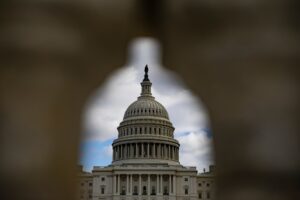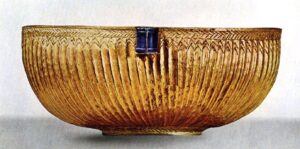
Photo: Samuel Corum, from NY Times (Jan. 1, 2020)
Last Friday, the U.S. Senate and House of Representatives successfully overrode a presidential veto to pass the National Defense Authorization Act, which includes provisions subjecting antiquities dealers to regulations under the Bank Secrecy Act. The art market, and the trade of ancient art in particular, has been a source of concern for regulators for many years: the rare disclosure of the identities of the ultimate buyers and sellers (even to each other) renders the market vulnerable to money laundering by criminal organizations.
By broadening the application of the Bank Secrecy Act of 1970 to include antiquities dealers, regulators will have the newfound ability to cut through the opacity of the antiquities market and subject transactions to additional scrutiny. Over the next year, the Financial Crimes Enforcement Network, a bureau within the Treasury Department, will consult with law enforcement, the private sector, and the public to determine how the law will be implemented. It is expected that regulations will echo those controlling the trade of precious metals and jewelry, where suspect transactions meeting certain criteria must be flagged to the federal authorities. It is also expected that the law will combat the use of shell companies to obscure the identities of parties involved in a transaction, which is a common occurrence in art market transactions.
While proponents of the bill feel the change to the industry is “long overdue,” antiquities dealers are less receptive. Randall A. Hixenbaugh, president of nonprofit organization American Council for the Preservation of Cultural Property, states that the government’s concern over money laundering has been blown out of proportion, and that the industry is already subject to the Bank Secrecy Act through the financial institutions used to facilitate high-value transactions. “Criminals seeking to launder ill-gotten funds could hardly pick a worse commodity than antiquities.” The industry has fought similar bills in recent years to intended to create more oversight for the art market. For instance, Christie’s auction house, has spent more than $100,000 on lobbyists in the last two years to influence legislative efforts in the US. Interestingly, the EU – and more recently, the UK – have already implemented anti-money laundering controls for art market participants that multinational corporations (such as Christie’s) must adhere to when carrying out transactions in those regions. As the country with the largest share of the global art market, it seems logical for the US to take a similar step.

Gold and lapis bowl from Ur, looted from the National Museum of Iraq (present location unknown). Photo: Oriental Institute Lost Treasures from Iraq database
Industry regulators and watchdogs have stressed the importance of these protections for years. Antiquities recently plundered from conflict-torn areas, like Syria and Iraq, have flooded the market over the past decade, often winding up in the hands of unsuspecting collectors. International law enforcement agencies believe that the black market for such works is supported not only by collectors and dealers, but also by terrorist groups. Moreover, a recent Senate report revealed that at least two Russian oligarchs used the art market to bypass U.S. sanctions. And in 2020, UNESCO warned that these issues latent in the art and antiquities market have only been exacerbated by the development of online sales platforms.
Inclusion under the Bank Secrecy Act will require antiquities dealers to adopt more stringent anti-money laundering practices, mostly focused on identifying parties to a transaction and reporting suspicious activity to regulators. While these provisions are limited to the antiquities trade, the rest of the art market may soon follow. The Act also calls on the Department of the Treasury to further investigate the relationship between money laundering and the wider art market, and to report its findings within a year. Overall, government oversight over the US art market is increasing, as evidenced by the Office of Foreign Asset Control (OFAC)’s advisory to art market participants concerning high value artwork. As a result, dealers, auction houses, artists, galleries, and collectors should all be aware of this trend and its potential impact on future sales.
As we reiterate in our ongoing provenance series, due diligence plays a key role in art market and antiquities transactions, and potential sellers and purchasers should be aware of developments and trends affecting the industry. In addition to avoiding legal liability, performing due diligence and ensuring transactions are as transparent as possible allows collectors to obtain peace of mind and enjoy their acquisitions. For dealers, assessing money laundering risks and implementing corrective measures in advance will minimize disruptions once legislation comes into force. At Amineddoleh & Associates LLC, we counsel a wide range of art market participants on regulatory matters. We will continue monitoring incoming legislation closely to determine how best to assist our clients.